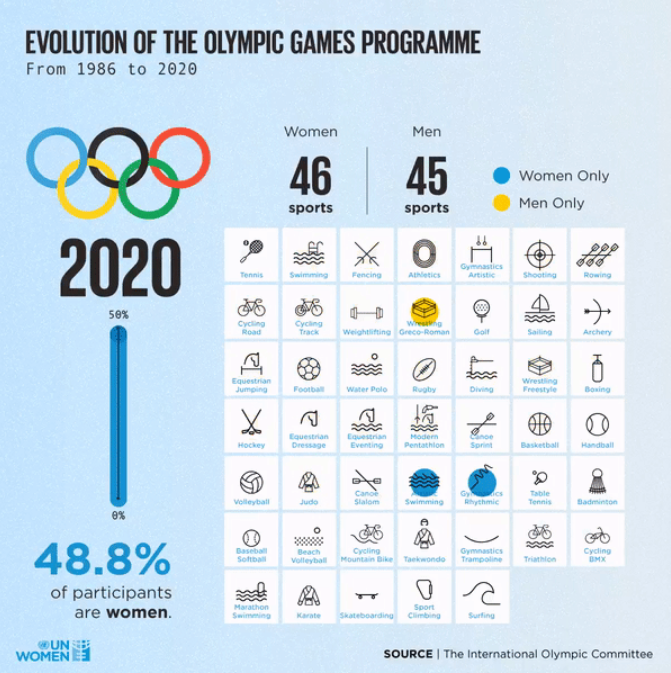Tokyo 2020 in the name of women4 min read

That the Tokyo Olympics were one of a kind was clear from the start. Since last year – when they should have taken place – and which instead, after various vicissitudes, began on 23 July 2021, albeit without an audience and with the bugbear of Covid-19.
We have already discussed the sustainability aspects surrounding this event. In fact, the Tokyo Olympics are considered the most sustainable in the history of the Games (read the full article here)
What we never expected to see – but it was clearly predictable – was the human side of the Olympics.
We are not talking about the emotions after a victory, the disappointment following a defeat, the regret of not having collected anything after years of training and sacrifices, or simply the happiness of being there.
We refer to specific events which – once they have happened and without even realizing it because we are witnesses to the facts in real-time – overwhelm the protagonists like a cyclone, generating an unprecedented media circus.
It may have been a coincidence, but the main facts revolved around female protagonists. And this can only be good. Let’s start for example with the participation of women in the Olympic Games.
ESG Trends at the Olympic Games
The most gender-balanced games in history
This news is probably the one that mostly went unnoticed compared to the rest. Probably only for statistics-enthusiast or for commentators of the inauguration ceremony. Tokyo 2020 Olympics are the most gender-balanced Games in history (49% of participating athletes are women). Furthermore, all 206 National Olympic Committees also have at least one female and one male athlete representative. This marks a landmark for gender balance in sport (link 1) (link 2).

Attitudes against the sexualization of women in sport
It happened in the case of the German athletes in gymnastics who decided to send a message against the sexualization of women in the discipline: no to low-cut and skimpy leotards, accused of being a way to emphasize their sexuality while competing. And so, in Tokyo 2020, the German athletes have decided to break a tradition of women’s gymnastics by wearing tracksuits that cover the legs from the neck to the ankles.

Another example is that of the Norwegian beach handball team who have decided not to wear a bikini, but rather shorts. In this case, they were punished with a fine – as the clothing did not comply with the regulation (“improper clothing”). The Disciplinary Commission has imposed a fine of € 150 each (for a total of € 1500). However, this created a great uproar in the world, so much so that the singer P!nk offered to pay the fine.
Mental health first
And here we are at the most striking case. Simone Biles was plagued by “twisties”, something that the general public has just learned at the Olympics but well known by gymnasts. In essence, the term indicates a kind of sudden mental block, causing the athlete to lose their sense of space and dimension as they’re in the air. This causes loss of control of the body, potentially leading to extra flips or not intended flips. Eventually, this can cause an unsafe landing on the ground.
In practice, the American athlete has decided to leave the competition – being replaced by a teammate. Later, Biles also added that the disharmony between her body and her brain was the specific reason she retired from the team competition.
In short, it seems that now more than ever awareness is emerging not only on the de Coubertinian values of sport (participation, respect, friendship, fairness) but also on aspects such as mental health, equal treatment of men and women, sexualization of roles. Something is changing, more than we thought and perhaps faster. Maybe it’s about social media or not, but now everything is becoming more democratic and every element is the subject of debate and confrontation. A disruption that often leads to the evolution of the whole society, not just of sport.
Source: Olympics.com, UN Women
Featured image by Viktar Masalovich from Pixabay






